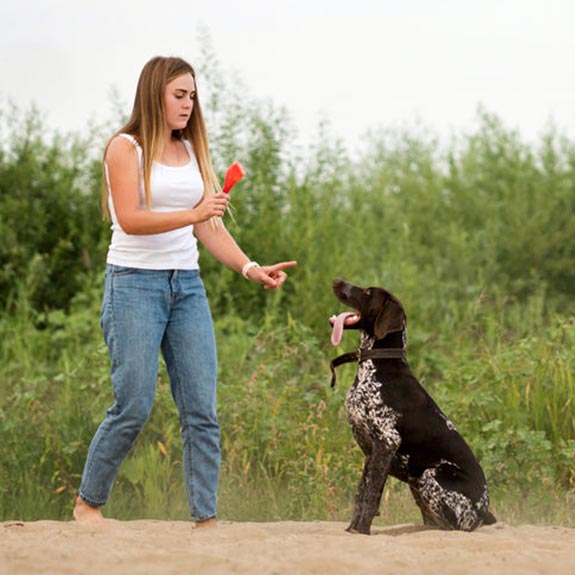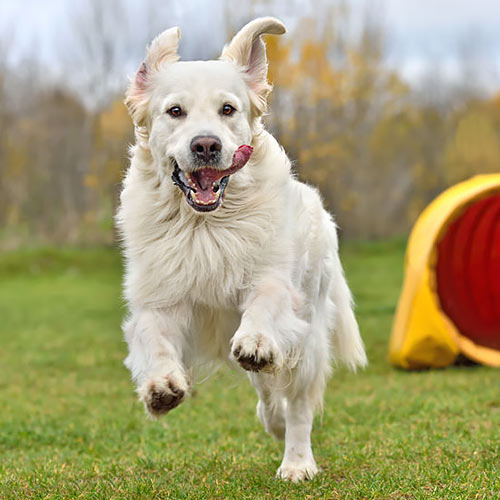Course Overview

Using a balanced training approach, the Dog Trainer College offers an array of courses to help you become a confident, competent and effective dog trainer. The Master Trainer comprehensive course combines the skills and techniques of our other courses so you will learn how to teach dogs in obedience training, protection, scent detection, service dog training, human remains detection, trailing, police/military k9 work, as well as Search and Rescue. You will also learn integrative business marketing techniques and management skills needed to promote your canine business. DTC also offers a unique hybrid online Master Trainer Program with online learning that includes two weeks of Instruction on-site at our Training Center.
The more services you offer, the more potential there is for income! Graduates of the Master Trainer course will be ready to start or expand their business and train many different types of dogs in most any role. Call today for more information or apply online to become a dog trainer or expand your skills. Please note that the Master Trainer Course is only available in the Spring (March) and Summer (July) semesters.
Please note: All students in this course will be involved as a decoy, helper, and handler. This will include bite-work with dogs in real-life settings. While safety measures will be in place, injury and/or death is a possibility. Those who are unwilling to be involved in this element of training should not apply to the Master Trainer course.
Both financial aid and/or lodging is available, if needed. With our competitive financing options, you can take this tremendous course for as little as $375/month*.
*Rates and terms will vary according to individual credit score, co-signer (if any), and amount of down payment.
Master Trainer Courses are Available in the Spring and Summer Semesters
The In-Person Master Trainer Course Begins February 24 and June 30, 2025
This course meets M-F from 9am to approximately 4pm
(Depending upon class size, weather, number of dogs to train, etc)
Classes are held on-site at our facility near Spencer, IN.
Graduates receive certification as a Master Dog Trainer.
This broad, intensive course is 20 weeks
$16,200.
What You Will Learn
- Learn how to work with the dog – not against him; bringing out the best in the dog
- Understand the concepts behind efficient training and the fundamentals of conditioning
- Create your own website that will attract visitors and establish business credibility
- Train a variety of dogs with a variety of needs using a variety of tools in a variety of ways
- Diagnose training problems and formulate a plan to overcome them
- Manage a kennel operation in a clean, healthy setting
- Grasp the proper (and improper) use of dog training aids
- Understand the importance of socializing puppies
- House-train dogs/puppies in the best way/s possible
- Use social media as a means of marketing your brand/product
- Know how a dog “pack” works
- Realize the need for socialization and how to be thorough in socializing puppies/dogs
- Be able to train dogs in both basic and advanced obedience
- Recognize canine anatomy
- Identify canine behaviors and signals
- Understand and implement canine ethology
- Diagnose different kinds of canine aggression
- Establish the foundation for beginning your own dog training business
- Recognize a variety of breeds and their inherent differences
- Understand the nutritional needs of the canine and how best to meet them
- Recognize health issues of the canine and be able to administer emergency first aid
- Understand how Search Engine Optimization works and what can be done to improve yours
- Utilize various advertising and marketing options
- Be able to effectively answer your client’s questions
- Realize the many kinds of training that you may consider offering to your clients
- Understand methods for Search and Rescue
- Teach the SAR re-find
- Handle dogs in both Urban and Wilderness SAR
- Grasp how to maintain SAR dogs
- Select solid candidates for Police K9 prospects
- Understand how to train the detection dog from start to finish
- Enhance the dog’s drives
- Conduct practical agility
- Possess a broad working knowledge of service dogs
- Be familiar with the equipment used in training service dogs
- Understand how to select dogs and puppies for service dogs
- Install and operate a productive puppy program
- Learn how to interact with disabled handlers
- Learn how the delivery process works
- Be able to train dogs, handlers and families
- Be able to train trailing dogs
- Understand Osphresiology and how it affects the search
- Implement scent discrimination trailing
- Be able to problem solve trailing training
- Train the Touch command
- Be familiar with the ADA
- Learn public access laws
- Understand service dog etiquette
- Understand tethering
- Be familiar with the public’s perception of service dogs
- Learn many of the situations faced by service dog handlers in public
- Be familiar with medical alert service dogs
- Train hearing assistance (signal) dogs
- Grasp mobility dogs training
- Have at least of basic understanding of autism
- Train autism assistance dogs
- Train PTSD seizure alert dogs
- Learn how to socialize the service dog
- Familiarize yourself with the service dog in a public setting
- Identify training problems and learn how to solve them
- Taking service dogs into schools and workplace
- Be familiar with MST and TBI assistance
- Apply a solid application process with prospective clients
- Develop an effective delivery process to clients
- Instruct handlers, K9 supervisors, and the K9
- Handle tracking/trailing dogs dependably
- Recognize canine behavior on the track
- Engage and neutralize a suspect
- Recognize inferior qualities that would hinder reliable K9 work
- Understand how genetics, upbringing, and training technique will influence the final product
- Recognize the variety of equipment used in K9 training
- Utilize equipment effectively, properly, and safely
- Learn how to be a great decoy (helper, agitator)
- Teach tracking/trailing searches in various environments
- Utilize patrol containment techniques
- Conduct SWAT operations with the K9
- Understand the need for real-life training and certifications
- Select solid candidates for HRD dog prospects
- Recognizing and teaching the canine’s cadaver alert
- Understand the use of various cadaver training aids
- Utilize cadaver training aids effectively, properly, safely, and without contamination
- Grasp the canine olfactory system
- Comprehend how environment will affect the search
- Understand scent theory
- Grasp basic human decomposition
- Comprehend case law that affects cadaver dog searches
- Utilize various cadaver detection training methods
- Understand how to dependably proof a dog
- Develop a thorough search pattern
- Diagnose training problems and formulate a plan to overcome them
- Be able to conduct both land and water searches
- Select solid candidates for detection dog prospects
- Understand how to train the detection dog from start to finish
- Understand the use of various detection training aids
- Comprehend case law that affects canine searches
- Recognize inferior qualities that would hinder reliable detection work
- Handle the dog in way that will encourage effectiveness yet without hindering his work
- Imprint a dog on the target odor
- Utilize various detection training methods
- Diagnose the right method to use with each individual dog
- Employ effective search methods and technique
Master Trainer Course Outline
- Conditioning
- Phases of Training
- Correction vs. Reward
- Basic and Advanced
- Proper use of a Prong collar
- Proper use of a Remote collar
- Clicker Training
- Baiting/Luring
- Puppies
- Housetraining
- Socialization
- Canine Anatomy
- Analysis
- Prevention
- Treatment
- Breed Awareness
- Dog-to-Human Aggression
- Dog-to-Dog Aggression
- Canine Communication
- Nutrition
- Canine CPR
- Canine First Aid
- Kennel Management
- Website construction
- Search Engine Optimization
- Social Media
- Advertising and Marketing
- Confidence Development
- The Trailing Dog
- Osphresiology
- Narcotics and Explosives Detection
- Basic Human Decomposition
- Imprinting
- Search Methods
- Teaching the Alert
- Proofing
- Problem Solving
- Land Cadaver Dogs
- Water Cadaver Dogs
- Cadaver Case Law
- Maintaining Cadaver Dogs
- Record Keeping
- Puppy
- Adult
- Puppy development
- Prey Drive
- Hunting Ability
- Imprinting Target Odor
- Simple Direct Association
- Deferred Response
- Other Detection Training Methods
- Search Methods
- Vehicle Searches
- Building Searches
- Teaching the Alert
- Problem Solving
- Proofing
- Puppy
- Adult
- Testing necessary drives
- Puppy
- Prey
- Defense
- Hunting Ability
- Bite Sleeves
- Bite Suit
- Remote Collar
- Proper Handling Techniques
- Agitation
- Working the Grip
- Target Biting
- Channeling Drives
- Prospects
- Case law
- Tactical Insertions
- Search & Seizure
- History of K9 training
- Real-life Scenario training
- Scent Theory
- Variable Surface Trailing
- Scent Discrimination Trailing
- The Bark Alert
- Problem Solving
- Patrol Containment Techniques
- Building Searches
- Open Area Searches
- K9 Swat Integration
- Problem Solving
- Service Dog Training
- Puppy
- Adult
- Delivering the Service Dog
- Handler & Family Training
- Public Access
- Interrogations
- Travel
- Puppy Program
- Signal Dogs
- Mobility Dogs
- Autism Assistance
- Post-Traumatic Stress Disorder assistance
- Traumatic Brain Injury assistance
- Military Sexual Trauma assistance
- Seizure alert and assistance
- Therapy Dogs
- Emotional Support Dogs
- Puppy Conditioning
- Public Settings
- Schools

